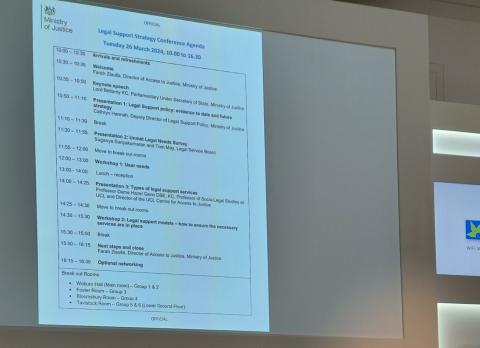Legal Support Strategy Conference 2024

Francine Ryan, Senior Lecturer in Law, and Director of the Open Justice Centre discusses her recent attendance at the Legal Support Strategy Conference hosted by Farah Ziaulla the Director of Access to Justice at the Ministry of Justice. The conference brought together organisations from across the advice sector to discuss the provision of legal support and legal advice.
The conference started with a keynote address from Lord Bellamy KC, Parliamentary Under Secretary of State, Ministry of Justice. The purpose of the conference was to discuss how the justice system ensures that people experiencing a legal problem can access high quality legal support at the right time ensuring that we best target finite resources.
Lord Bellamy identified six areas of discussion:
- Signposting- how do we ensure that people know where to go for help and that they are signposted to the right information and services.
- Technology- what is the role of technology in supporting people to access information. How do we ensure that we establish a trusted system that provides people with the information they require that is trustworthy, relevant, and up to date.
- Early intervention- how do we get to the stage where we are helping people to resolve their legal problems early before they escalate and how do we encourage people to explore alternative dispute resolution options.
- Legal support versus legal aid- how do we apportion resources, and how do we measure value for money. The Ministry of Justice is currently carrying out a review of civil legal aid.
- Holistic approach- often people don’t just have a legal problem it is connected to a social problem. Many legal issues are underpinned by social problems so how do we address the interconnection between social and legal problems.
- What works best- how do we know what is working, how do we harness the legal support strategy to address access to advice and access to justice to ensure that the taxpayer is getting value for money.
The issues Lord Bellamy highlighted are challenging in a time of increased demand, complex needs, and where people are facing a cluster of issues. Legal support is complicated and for most people navigating the legal system is confusing and often very frightening. The second presentation was from the Legal Services Board which was reporting on its research on legal needs that will be published next month (April). The survey collected data from 17,668 adults in England and Wales identifying 34 legal issues and used the OECD framework for estimating legal needs. Of those people who identified they had a legal issue, 62% of people got help and 38% of people did not get help. Of those who received help for their legal issue, 52% had professional help and 11% had assistance from family and friends. The survey asked where or who people sourced advice from, the top six included solicitors, doctors, insurance companies, another person or organisation, family/ friends, and citizen advice (Legal Services Board, 2024).
The research explored legal capability and unmet legal needs. People were asked about their levels of legal confidence- 38% had low levels, 50% had medium and 12% people had high levels of confidence. Participants who had experienced a legal issue were asked if they wished they had done anything differently, 20% said they wished they acted sooner and 11% wished they had got information or assistance sooner (Legal Services Board, 2024). The findings suggest there remains a pressing need for people to have access to legal information that can help them understand their legal rights and increase their levels of confidence.
There were two breakout sessions during the conference where small groups with a facilitator discussed some of the issues. The group I was in included representatives from Citizens Advice, the Money Advice Service, law centres, refugee and asylum charities, the legal services board, and tech companies. The discussions were really valuable and insightful. From a personal perspective I learned so much from organisations on the front line about the increasing complexity of issues their clients are experiencing, the challenges around the lack of access to specialist solicitors and the difficulty of organisations to sustain their services.
There is an urgent need to improve people’s legal capability, some of that is around simplifying legal procedures and offering low-cost alternative resolutions to court proceedings, but there is also a pressing need to ensure that there is the availability of timely advice situated in communities. We also need to have conversations around how we leverage technology particularly in the provision of legal information to support access to justice. Further workshops are planned, and the Open Justice Centre will be feeding into the discussions which will help to inform, support, and develop policy on access to justice.

Francine Ryan
Francine Ryan is a qualified solicitor, Senior Lecturer in Law and Director of the Open Justice Centre at The Open University.
Francine has worked to develop a range of innovative and technology-enhanced opportunities for OU law students including the Open Justice Online Law Clinic.
Francine’s research areas are in technology and the law.
